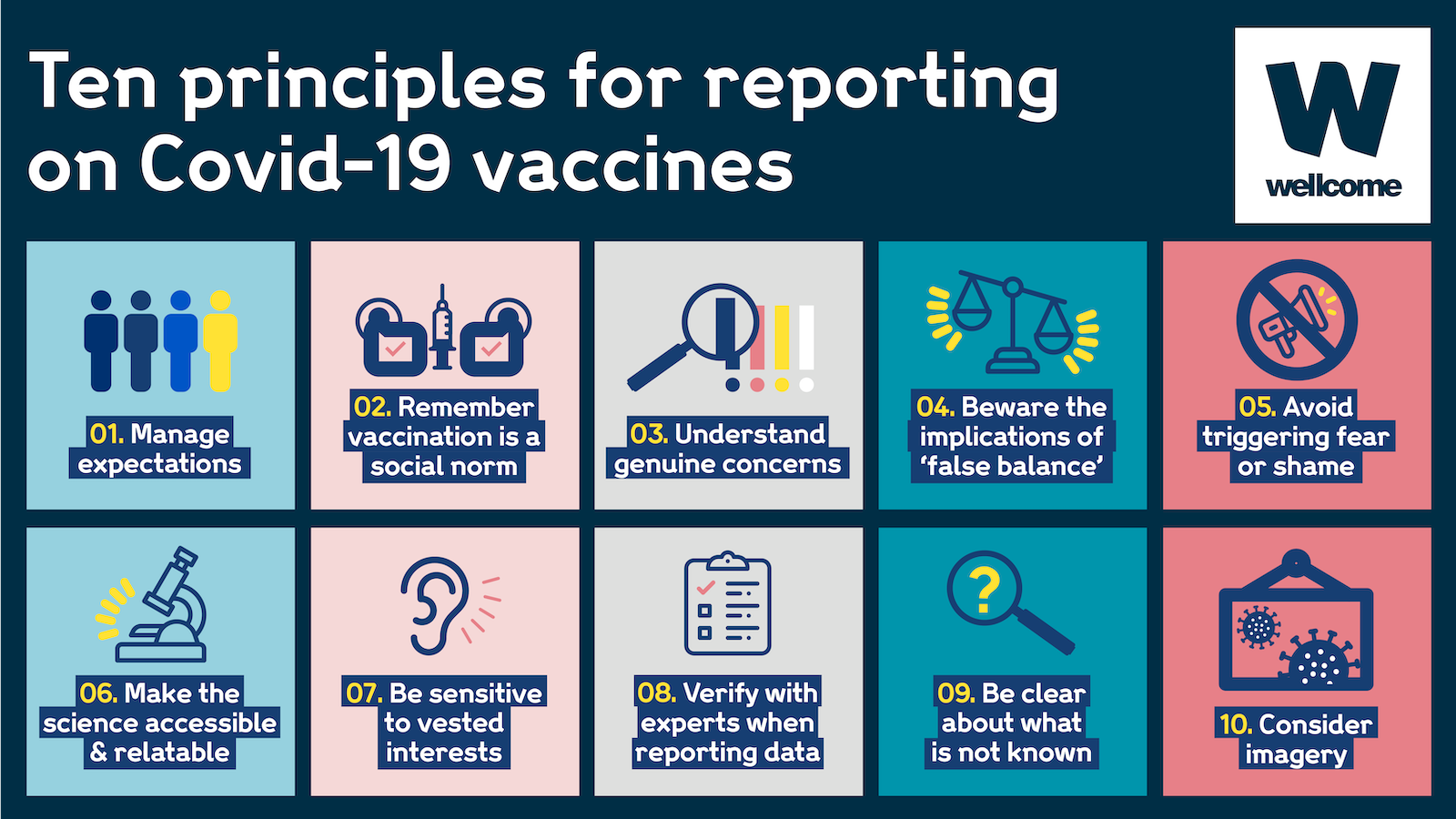Principles and guidelines for reporting on Covid-19 vaccines
Here are ten useful principles for anyone reporting on Covid-19 vaccines, from communications experts new to this topic to experienced journalists.


Here are ten useful principles for anyone reporting on Covid-19 vaccines, from communications experts new to this topic to experienced journalists.
The following ten principles have been gathered from respected media organisations around the world and Wellcome’s own experience in vaccines. They are designed to support anyone new to this topic, but can also act as a timely reminder to those closer to it and can sit safely alongside existing industry codes of practice and policies.
Vaccines are still huge news and the agenda and conversation will continue to evolve, from a focus on vaccine development, to the global vaccination rollout. Each new development and stage of this journey brings new challenges and prompt new questions, and the role of communicators and writers in helping the public understand and navigate this highly complex subject will continue to be critical if we are to successfully vaccinate the world's population.
Access
Vaccines are coming, but most people around the world will not get one for many months, and in some cases years. Every country will be developing its own strategy and plan for rollout, but it's likely most will start with vulnerable priority groups first, because the faster we can make sure the most vulnerable are safe, the faster we can lift restrictions on everyone else. But the pandemic cannot be beaten one country at a time and the global economy cannot recover unless vaccine distribution is managed fairly. This will require difficult choices on vaccine allocation.
Efficacy
Covid-19 vaccines will be crucial in reducing severe illness and death but,
like most health interventions, can never be 100% effective. This does not mean they will not play a key role in ending the pandemic. For example, in 2019-20, the flu vaccine was around 40% effective, but it still prevented 7.5 million flu cases, 3.7 million visits to the doctor, 105,000 trips to the hospital, and 6,300 deaths.
Adverse events
Some people will feel mild side effects to the Covid-19 vaccines, such as fatigue or headaches, in the same way that some people feel side effects from common medicines such as aspirin, ibuprofen or even the flu jab. Given that billions of people are likely to get the vaccine, it's possible that we’ll also hear about some rare, more severe allergic reactions. If and when individual severe reactions are reported, we recommend establishing all the facts first and guarding against reporting speculation.
Despite the presence of a loud minority, data clearly shows that acceptance of vaccination is still very much the norm in almost all countries around the world. Behavioural science tells us that people make decisions based on what others do – in particular they tend to do what other people like them are doing – so it’s important to reflect this position accurately, if we are to support a successful rollout.
Many people have legitimate questions and concerns, and these groups must not be confused or unfairly labelled alongside the minority of people who do not support the idea of vaccines at all. Most legitimate concerns can often be addressed by communicating the science effectively and providing people with accurate information.
Presenting a balanced view is important, but false balance can have serious implications on the decisions people take. False balance occurs when opposing viewpoints are presented in a way that suggests they carry the same weight, when this is not supported by the evidence.
For example, a televised conversation between someone representing the majority of the scientific community, that agrees on the impact of global warming, is 'falsely balanced' by someone representing a small group of climate-sceptic scientists. It falsely creates the perception that there are two equal positions in the scientific community.
A minority of people are anti-vaccination, so we need to be wary of providing a platform for them to push their agenda. Vaccination is a social norm in almost all countries around the world and overwhelmingly supported by the majority of healthcare workers and the scientific community.
These are unsettling and worrying times and 2020 has put a huge strain on people’s mental health. Be careful not to trigger emotional reactions like fear or shame, which can elicit negative responses like blame and 'othering', making people less likely to engage with the science in a rational way.
Explain any scientific terminology clearly and, where possible, try to avoid scientific jargon altogether. Humanise stories in order to help people relate to them, through interviews with researchers, nurses, virologists, or even participants from previous vaccine trials. Research shows that when it comes to trust, healthcare workers rank highest with the public. These voices can have a powerful impact on how populations respond.
Analogies are proving to be a simple and effective way to help communicate the science. For example, 'A vaccine is a bit like wearing a shield. The more effective it is, the better, but even a partial shield is better than no shield at all.'
Or, when it comes to the speed of vaccine development and production. 'It’s a bit like driving across a busy city in rush hour. Normally you spend lots of time waiting at traffic lights, but for the Covid-19 vaccines, it’s as though they’ve all been turned to green and you have a police escort.'
Don’t rely exclusively on press releases or statements where there is a clear vested interest. It is not uncommon for misunderstandings or misconceptions to arise from the translation of scientific documents for public consumption, so always ask to see the scientific papers for yourself to ensure you have the full picture.
Always check with impartial experts and quote sources. Build a network of people that can help you along the journey from initial trials through to global vaccination and vaccine distribution. Wellcome has experts available to support, as well as a network of scientists and specialists we can put you in touch with.
With so many vaccines in different stages of development, it’s important to be specific with the data and explain context around the numbers. Treat data with the same degree of reserve as you would quotes, remembering that statistics can be used to both support and disprove a point of view.
The BBC has an extensive guide on the use of statistics by journalists.
When it comes to vaccines and vaccination, it is as important to be clear about what is not known, just as much as what is. Not explaining or being explicit about the former can often leave a vacuum that is easily filled with speculation, or misinformation.
Try to steer clear of stock images that reinforce stereotypes or images that depict negative associations with vaccines (such as large needles). Check supporting images are also from the time, place and location they claim to be and try to use imagery that best represents and reflects your audience. It helps for people to see real people like them, or people they trust, taking a vaccine.
Tips for professional reporting on COVID-19 vaccines, World Health Organization
COVID-19 Safety Advisory for Media Professionals, The International Federation of Journalists
Advice for journalists covering Covid-19: Welsh NHS Confederation, University of Cardiff
Tips for Journalists Covering COVID-19, Global Investigative Journalism Network
A practitioner's guide to the principles of COVID-19 vaccine communications, Center for Public Interest Communications at the University of Florida College of Journalism and Communications, in partnership with Purpose and the United Nations Verified initiative
COVID-19 Journalist Guidance: How to Report Accurately on COVID-19 Vaccines, Internews
Reporting on coronavirus vaccines: 5 tips to help journalists inject audiences with the facts, Journalist’s Resource
Covid-19 Reporting Guidelines, International Media Support
Covering COVID-19: reports, resources, and tools, The Global Forum for Media Development.
Here are ten useful principles for anyone reporting on Covid-19 vaccines, from communications experts new to this topic to experienced journalists.

